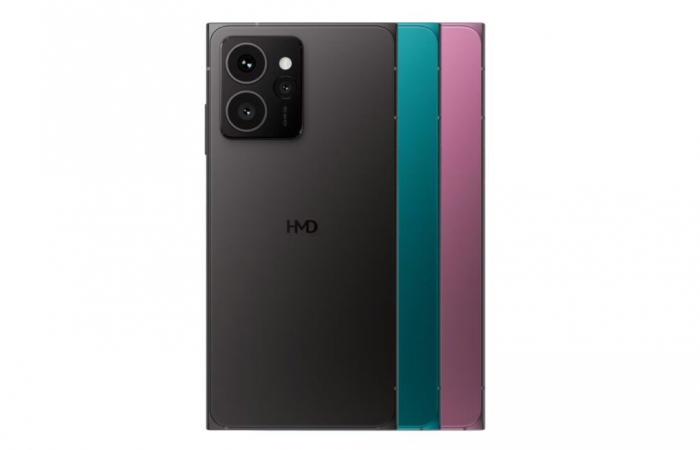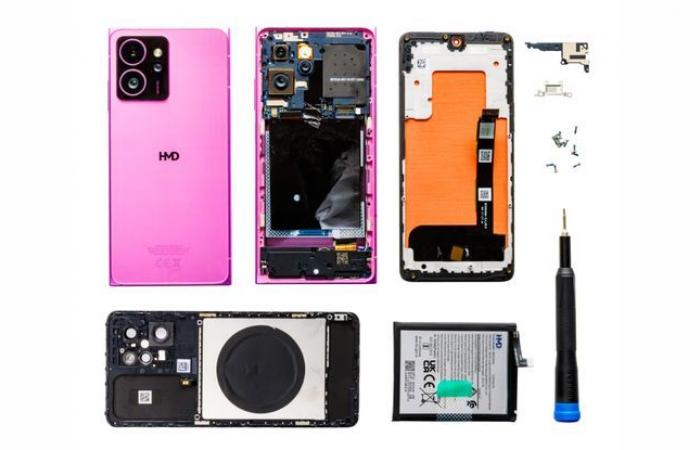HMD? The name of this manufacturer may not mean anything to you. It is the one who, in 2016, at the initiative of former Nokia managers, took over under license the manufacturing of mobile terminals for the former telephony giant, then in complete disarray. Until 2023. The Finnish entity HMD (For Human Mobile Devices) recently decided to develop terminals under its own name and launched with the Skyline, a smartphone that stands out and that 20 Minutes a pu tester.
The heir to the Nokia N9
Visually, it’s impossible not to find a little family resemblance with an illustrious ancestor, the Nokia Lumia N9, released in 2011. Then presented as “100% touchscreen and without sliding keyboard” (!), only having a screen 3.9 inches (9.90 cm), a single 8 megapixel photo sensor and a capacity of 16 or 64 GB (it worked under the MeeGo 1.2 OS), the mobile of the time is giving way today now it has a state-of-the-art terminal.
The Skyline is displayed with a 6.55-inch (16.63 cm) Full HD + OLED screen, a triple photo sensor* including a 108 megapixel main sensor, 128 or 256 GB of memory (and runs Android 14) . What a long way we have come!
A more advanced Action button than at Apple
Available in three colors (the same as the Nokia N9 in its time: black, blue, pink), the Skyline can be a little confusing with its flashy tones and its design with protruding angles, it nonetheless remains innovative. Not that its specific features completely distinguish it from a mid-range smartphone. But you still have to credit a few little extra things that make life easier.
First, the fact that it is the first Android to adopt the new Qi2 wireless charging standard. Based on Apple’s MagSafe technology, faster than the Qi standard (15 W vs 7.5 W), this compatibility avoids the need for a magnetic case. The smartphone, which has its own magnetic ring, fits perfectly onto compatible chargers.
Then, the fact that the HMD smartphone has its Action button. On the left edge (as on the iPhone 15 and 16 which initiated it), this customizable button goes further than at Apple. Here, it is possible to assign two functions to it (triggered in one or two successive presses) to configure in the Settings: from Flashlight to Photo, also including the welcome Directions (or Uber!) to your home or workplace . Practical.
Screen, battery, connectors… repairable
Finally, HMD has sealed a partnership with iFixit, “the DIY repair specialist” to make its Skyline a more durable smartphone. Result: no need to find a repairer (although he must be trustworthy…) and leave a kidney to replace a broken screen, change a battery or one of the various replaceable components on the terminal.
With a few precision tools in hand, it is simple thanks to the detailed tutorials on the iFixit website to replace damaged or defective parts with new ones ordered online: the battery (24.95 euros); the charging port (19.95 euros); the rear shell (29.95 euros); the speaker (14.95 euros); the SIM card drawer (14.95 euros); and obviously the screen which remains quite expensive (94.95 euros). These spare parts are advertised as being available for at least 7 years. HMD’s approach here is the same as that of Fairphone, the Dutch firm which, since 2013, has been developing sustainable and responsible electronic devices (smartphone, headphones and audio earphones).
Limited updates
But paradox: when HMD advances its Skyline with an extendable lifespan, the manufacturer is unable to offer it more than 2 years of Android updates and three patchs safety! Does this mean that in 2026 it will be obsolete? Disappointing, when Samsung and Google promise up to 7 years of updates on some of their smartphones… which cannot be repaired by yourself!
The HMD Skyline remains a convincing mid-range smartphone in terms of its performance/price ratio. Sold at 449 euros for 128 GB and 549 euros for 256 GB (with expandable memory up to 512 GB), the device can obviously suffer from some weaknesses.
We will mention its 4,600 mAh battery which is a bit tight; or the SnapDragon 7s Gen 2 / 8 MB processor which is not the most impressive in the Qualcomm family. Without forgetting its only IP54 certification which only protects it against splashes and dust (it could not be repaired if it were 100% waterproof, a question of joints…).
For the rest, it has its little extra things, which make it unique. And repairability (rated 9/10 by iFixit, behind the Fairphone 5 rated 10/10), which many others would do well to take inspiration from.
* Rear: 108-megapixel main sensor (f/1.7); 50 megapixel telephoto lens (f/2.0); 13 megapixel ultra wide angle (f/2.4). Front: 50 megapixel sensor (f/2.5).







